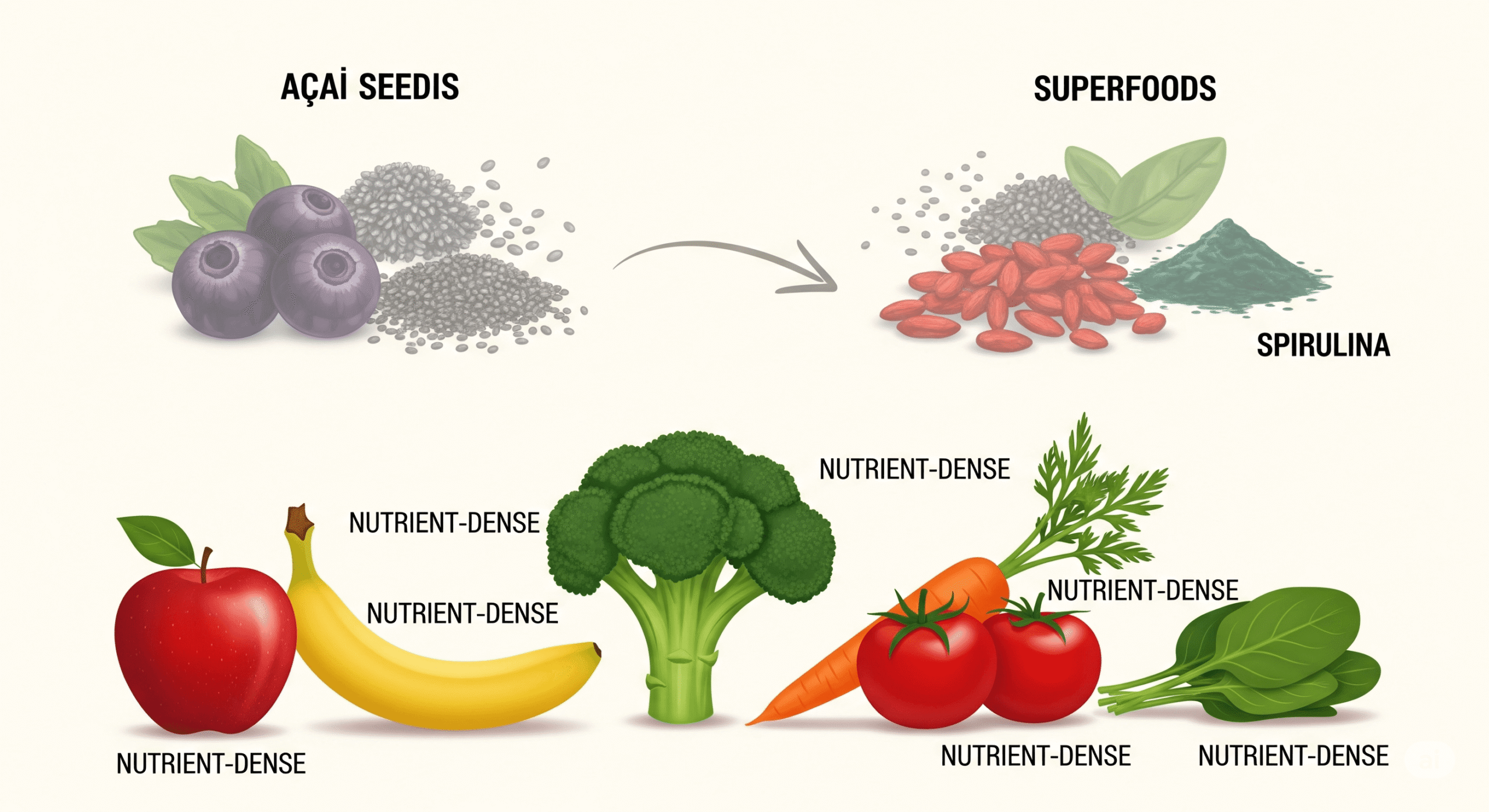
Nutrient rich foods vs Overpriced items highlighting the superfood myth.
The superfoods myth is everywhere. From acai bowls to spirulina smoothies, these foods are marketed as miracle cures. But are they better for your health? Or just better for someone else’s profits?
Health experts and dietitians agree: there’s no such thing as a magical food. True health comes from consistent, balanced nutrition, not from exotic powders or overpriced berries.
In this article, we explore five expert-backed truths to help you see through the hype, make smarter food choices, and protect your wallet.
🥑 Truth 1: “Superfoods” Is a Marketing Term, Not a Scientific One
The word “superfood” sounds powerful. But in reality, it has no scientific definition.
“Superfoods are a marketing invention. They oversimplify nutrition and distract people from the bigger picture,” says Dr. Catherine Collins, NHS Dietitian. (source)
Marketers use the term to sell products, not to educate. A bag of chia seeds labeled “superfood” can cost 3x more than regular oats, despite offering similar nutrients.
In truth, every whole food has value, not just the ones with a trendy label. What matters is how they fit into your overall diet.
🔗 For more on building a healthy eating pattern, visit the Balanced Diet Basics guide.
🍓 Truth 2: No Single Food Can Prevent or Cure Disease
Superfoods are often linked with bold claims:
“Fights cancer.” “Protects your brain.” “Boosts immunity instantly.”
These statements are rarely backed by real science.
While certain nutrients like antioxidants, fiber, or omega-3s can support health, they don’t work in isolation. The body functions best when you consistently get a variety of nutrients from different sources.
Let’s take blueberries as an example. They are rich in antioxidants, but you’d need to eat kilos of them daily to see any dramatic effect. It’s not realistic or sustainable.
🧠 Want to boost long-term health the right way? Check out our Daily Wellness Checklist.
🥬 Truth 3: Exotic “Superfoods” Are Often Overpriced and Not Superior
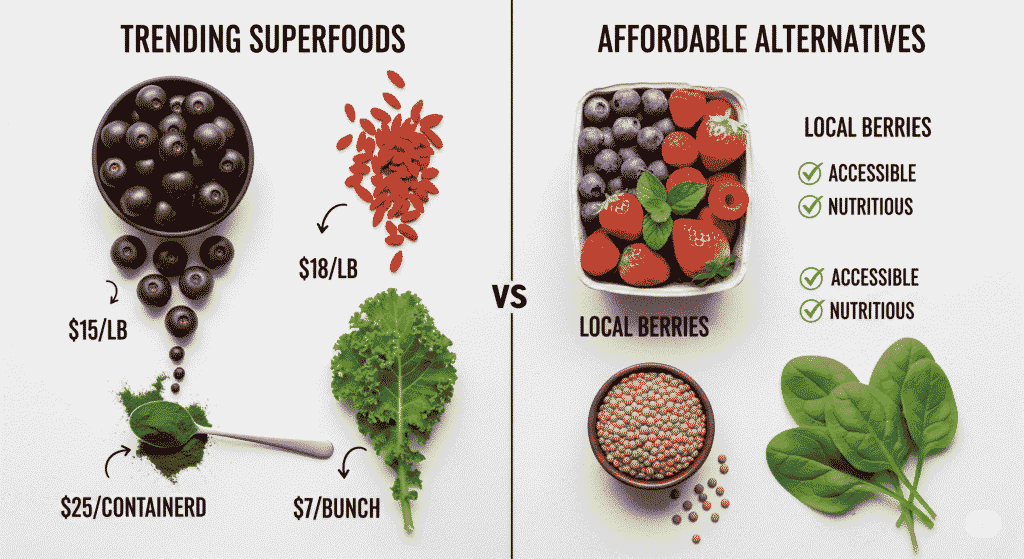
Superfoods like maca powder, açai berries, or spirulina are often imported and heavily processed. Their prices are inflated by branding, packaging, and international transport.
But here’s the truth: you can get the same or better nutrition from local, seasonal foods.
| Expensive Superfood | Affordable Alternative |
| Goji berries | Indian amla (gooseberry) |
| Kale | Spinach or mustard greens |
| Quinoa | Brown rice or millet |
| Chia seeds | Flax seeds |
“Often, local foods have higher nutrient bioavailability, especially when fresh,” says Dr. Ritu Mathur, Clinical Nutritionist.
🌾 Explore affordable, nutritious options in our Budget Nutrition Guide.
🥗 Truth 4: Superfood Obsession Can Lead to Nutrient Imbalance
Focusing too much on certain trendy foods can limit your nutrient intake.
For example, eating a lot of chia seeds may give you omega-3s, but neglecting other food groups could mean you’re missing protein, calcium, or B vitamins.
A truly healthy diet isn’t built around one or two “super” ingredients. It includes:
- Fruits and vegetables of all colors
- Whole grains
- Legumes and lentils
- Healthy fats
- Lean proteins
- Water and fiber
Variety = Balance. Balance = Real health.
⚖️ For a customizable weekly plan, visit our Nutrient-Rich Meal Planner.
🥣 Truth 5: Real Health Comes from Variety, Not Hype
Superfoods may be a trend, but good nutrition is timeless.
Experts agree that nutrient-dense foods—not “superfoods”—should form the base of your diet. These are foods high in vitamins, minerals, and fiber, but low in sugar, sodium, and unhealthy fats.
Examples include:
- Lentils
- Leafy greens
- Sweet potatoes
- Oats
- Eggs
- Seasonal fruits
These foods are affordable, widely available, and easy to include in everyday meals.
“Don’t fall for fancy packaging. Eat real, whole foods daily,” says Dr. Rajeev Gupta, Public Health Advocate.
🍲 Want to switch to nutrient-dense eating without stress? Read our Whole Foods Starter Guide.
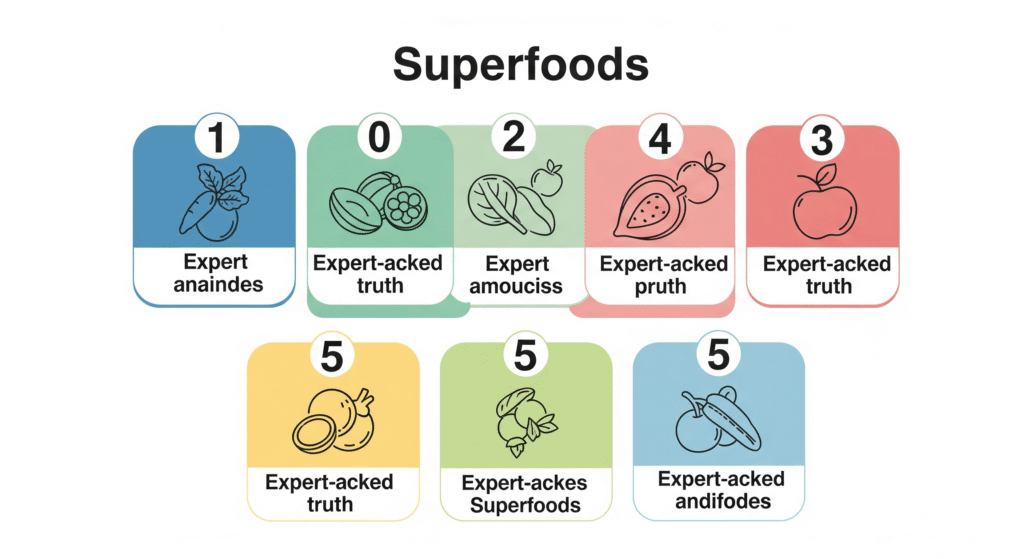
📣 Final Thoughts: Say No to the Superfood Myth
The superfood myth is clever marketing, but poor health advice.
The idea of one food “fixing” everything is appealing, but unrealistic. Good health doesn’t come from trends. It comes from eating a wide range of nutritious foods, staying active, sleeping well, and reducing stress.
So next time you’re tempted to buy that pricey powder or imported berry, ask yourself:
Is it truly better? Or just better marketed?
✅ Focus on variety, balance, and affordability. Your body—and your wallet—will thank you.
✅ Quick Recap: 5 Truths About Superfoods
- Superfood is just a marketing term
- No single food prevents or cures disease
- Local foods are often just as nutritious
- Variety is key to nutrient balance
- Nutrient-dense foods build long-term health



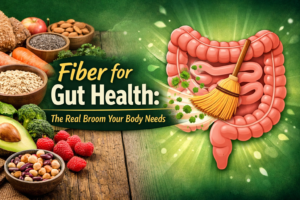
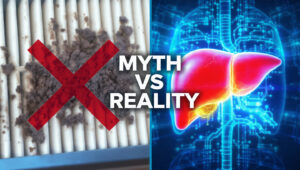

Thank you for your sharing. I am worried that I lack creative ideas. It is your article that makes me full of hope. Thank you. But, I have a question, can you help me?